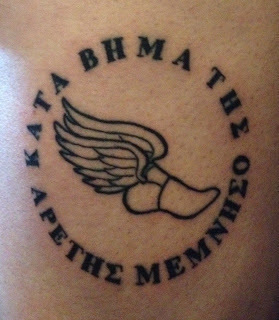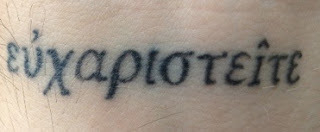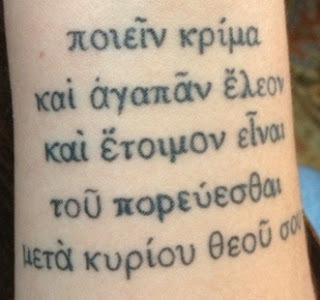Middlebury College
∞
Gracias, señora Orza
Estimada Sra. Orza,
One day when I was in middle school in New York you said to me “You’re good at languages. You should go to Middlebury.” I hadn’t heard of it before, and I had been planning to attend the cheapest local college I could attend, to save my family the cost of college. Then you handed me a brochure from Middlebury, about their summer language programs. A year later, when I was leaving to work in Nepal for the summer, you gave me a blank journal as a parting gift, reminding me that writing matters.
I haven’t seen you since then, and I haven’t been able to track you down to thank you in person, so I’m firing this out into the internet to say thank you to you and to all the other teachers like you. Why? Because you changed my life.
Three years after I last saw you, I drove to Middlebury to check it out, and I fell in love with the place. I sat in on a Religion class (a subject I thought I wouldn't find interesting at all) and learned more about religion in that single hour than I thought possible.
So I applied, and I got in, with a scholarship. I guess they thought I should go there, too! Over the next four years that college made it possible for me to study in Spain; to learn to read and translate multiple forms of classical Greek; to be exposed to history as more than names and dates; to study physics, and math, philosophy, and even a little more religion.
Looking back on those years now, I see that my whole career has arisen out of classes I took there.
And best of all, I met this amazing woman! I think you’d like her. Like you, she’s smart and sweet. Like you, she encourages me to keep learning. And like you, she’s fluent in Spanish.
Far more than the classes, she has changed my life. So often it's the people you meet--and not just the things you learn--that change you. I'm grateful to have met you both.
So thanks for being a Spanish teacher in a middle school in rural New York. Thanks for putting up with all of us kids in your classes, year after year. And thanks for taking my future seriously enough that you thought that my life, my travels, and my studies really mattered. You saw all that far more clearly than I did back then, but over the years I’ve come to see what you saw, and I’m forever grateful.
Your loving student,
Dave
One day when I was in middle school in New York you said to me “You’re good at languages. You should go to Middlebury.” I hadn’t heard of it before, and I had been planning to attend the cheapest local college I could attend, to save my family the cost of college. Then you handed me a brochure from Middlebury, about their summer language programs. A year later, when I was leaving to work in Nepal for the summer, you gave me a blank journal as a parting gift, reminding me that writing matters.
I haven’t seen you since then, and I haven’t been able to track you down to thank you in person, so I’m firing this out into the internet to say thank you to you and to all the other teachers like you. Why? Because you changed my life.
Three years after I last saw you, I drove to Middlebury to check it out, and I fell in love with the place. I sat in on a Religion class (a subject I thought I wouldn't find interesting at all) and learned more about religion in that single hour than I thought possible.
So I applied, and I got in, with a scholarship. I guess they thought I should go there, too! Over the next four years that college made it possible for me to study in Spain; to learn to read and translate multiple forms of classical Greek; to be exposed to history as more than names and dates; to study physics, and math, philosophy, and even a little more religion.
Looking back on those years now, I see that my whole career has arisen out of classes I took there.
And best of all, I met this amazing woman! I think you’d like her. Like you, she’s smart and sweet. Like you, she encourages me to keep learning. And like you, she’s fluent in Spanish.
 |
| We started dating in college, and we're still dating each other now, even though we're both married. I think you'd like her. |
Far more than the classes, she has changed my life. So often it's the people you meet--and not just the things you learn--that change you. I'm grateful to have met you both.
So thanks for being a Spanish teacher in a middle school in rural New York. Thanks for putting up with all of us kids in your classes, year after year. And thanks for taking my future seriously enough that you thought that my life, my travels, and my studies really mattered. You saw all that far more clearly than I did back then, but over the years I’ve come to see what you saw, and I’m forever grateful.
Your loving student,
Dave
∞
Perennial Thinking in Education, Ag, and Culture - Lori Walsh interviews Bill Vitek and me on SDPB
Last week I had the pleasure of hosting Bill Vitek at Augustana University. Together we taught a philosophy class and a biology class, he spoke in our chapel, and he gave a lecture on campus.
One of the persistent themes of his work is the connection between culture and agriculture: the two shape one another.
Another theme that is related to the first: we all eat, and we all think, and eating and thinking indluence one another.
A third theme: we tend to focus our thinking on the annual or the short-term, neglecting the perennial and long-term. having spent a few days with Bill, I'm now reflecting on what I find one of the most provocative parts of his work: what would it mean to shift from thinking of education as an annual crop to thinking of it as a perennial? Currently we begin planting at the beginning of the season, and we expect to harvest grades and graduates at the end of the term.
What if we thought of education in the way we think about caring for perennials? What if we considered school to be more like the planting of trees than like the planting of corn? Or what if we figured out a way (as they are doing at the Land Institute, where Bill is a collaborator with Wes Jackson - here's a link to one of their co-edited books) to give our annual crops perennial roots?
I have a lot of work and thinking and cultivating ahead of me, so I won't answer those questions here. If you have taken my classes, you already know how I have been working on this over the years (think of how I speak about grades and exams in my classes, for instance). And if you've read my books (like my book on C.S. Lewis' environmental thought, or my book on brook trout as indicators of both natural ecology and cultural ecology), you know I'm working on these ideas, and they will require long cultivation. I'm okay with that.
For now, feel free to listen to Bill and me as we are interviewed by Lori Walsh on South Dakota Public Radio.
One of the persistent themes of his work is the connection between culture and agriculture: the two shape one another.
 |
| A bit of prairie, with perennial grasses. |
Another theme that is related to the first: we all eat, and we all think, and eating and thinking indluence one another.
A third theme: we tend to focus our thinking on the annual or the short-term, neglecting the perennial and long-term. having spent a few days with Bill, I'm now reflecting on what I find one of the most provocative parts of his work: what would it mean to shift from thinking of education as an annual crop to thinking of it as a perennial? Currently we begin planting at the beginning of the season, and we expect to harvest grades and graduates at the end of the term.
What if we thought of education in the way we think about caring for perennials? What if we considered school to be more like the planting of trees than like the planting of corn? Or what if we figured out a way (as they are doing at the Land Institute, where Bill is a collaborator with Wes Jackson - here's a link to one of their co-edited books) to give our annual crops perennial roots?
 |
| A view of the Augustana University campus, with historic buildings. |
I have a lot of work and thinking and cultivating ahead of me, so I won't answer those questions here. If you have taken my classes, you already know how I have been working on this over the years (think of how I speak about grades and exams in my classes, for instance). And if you've read my books (like my book on C.S. Lewis' environmental thought, or my book on brook trout as indicators of both natural ecology and cultural ecology), you know I'm working on these ideas, and they will require long cultivation. I'm okay with that.
For now, feel free to listen to Bill and me as we are interviewed by Lori Walsh on South Dakota Public Radio.
∞
Written On The Skin
One of the peculiar things about teaching Greek and knowing several other ancient languages is that people often come to me seeking help with tattoos.
A few years ago a student named Brian came to me and asked "How do you say 'Suck Less' in Greek?" Apparently this was a phrase that his running coach said to his team to inspire them to run better.
As crude as the phrase is, I was intrigued by the problem of translation. "In order to translate the phrase I'd have to know what you mean by it," I replied. I spent a little while explaining how it would be possible to say, for instance, that an infant should nurse less; or that one should inhale less strongly. Or, if you pursue the more colloquial usage of the verb "suck," you might decide that it refers to poor behavior or - ahem - to a kind of erotic pleasure-giving in which the giver is thought to be demeaned by the giving.
Eventually I made the case that if you want to say it in Classical Greek, it would make sense to say it in a way that attended to the use of words in that language, and pointed him to Plutarch's Sayings of Spartan Women as a source of pithy sayings about living and acting strenuously. Ever since I took my first Greek class with Eve Adler at Middlebury College years ago, I've liked the phrase η ταν η επι τας, (at the link above, see #16 under "Other Spartan Women"; click on the Greek flag to see the full Greek text) which is often translated "Come back with your shield or upon it," meaning "Act virtuously in battle; either die with your weapons or win with your weapons, but do not throw them away in order to win your life at the expense of your virtue." I like the Greek phrase for its Laconian pithiness.
Of course, that one didn't quite make sense for a runner, so I showed him another from the same collection, κατα βημα της αρετης μεμνησο, or "With every step, remember [your] virtue." ("Virtue" is not a perfect translation; you could translate it as "excellence" also.)
Three years have passed since that conversation with Brian, but a few months ago he tracked me down and showed me his tattoo, which I rather like:
In a new twist, last year another student asked me to help him find the Greek verb "give thanks" as it appears in I Thessalonians 5.18. He didn't tell me what he planned to do with it, but when I saw him later that year at a wedding he showed me this, which he has tattooed on his wrist:
The word you see is ευχαριστειτε, related to our word "Eucharist" and the modern Greek ευχαριστω, meaning "I thank you."
I say this is a "new twist" because at least one passage in the Hebrew scriptures (Leviticus 19.28) appears to prohibit tattooing one's skin. Getting a tattoo, and in particular getting a tattoo of scripture, offers a bit of insight into one's hermeneutics. If the Gospels prohibited tattoos, I doubt many Christians would get them, but since the prohibition comes in the Hebrew scriptures, and since it seems to be tied to particular practices of worship or enslavement that no longer seem relevant, many young Christians are untroubled by it.
Recently one of my advisees showed me one of several tattoos she has recently acquired. This one is a longer Biblical text, from the prophet Micah, chapter 6, verse 8. I thought it interesting that she chose to get the Septuagint Greek rather than the Hebrew. She knows and translates Biblical (Koine) Greek and so I suppose she felt closer to that language. The text below means "...to do justice and to love mercy and to be ready/zealous to walk humbly with the Lord your God."
I like that verse quite a lot. If you don't know it, it begins by saying that this is what God asks of people. It's the sort of description that makes religion sound less like a burden and more like a description of a life well-lived.
I'm always reluctant to give advice about tattoos, because they're so permanent and so personal. And when I do give advice, I always want to write footnotes about regional dialects and historical and textual variants, or about the difficulties of translation. Quotes out of their native context so often seem lonely to me - such is my academic habit, of always seeing texts as living and moving and having their being* in nests and webs of other texts. Perhaps that's why I've never been inked myself, and I doubt I ever will get a "tat." I'm just not confident I've found words or an image that I'd want written on me forever. Sometimes that feels virtuous because it's prudent; other times I wonder if that's not a moral failing on my part, like I should be willing to commit to something. But I think for now I will remain uninked, and will continue to admire the commitments of my students.
* For example: I am borrowing this phrase ("live and move and have their being") from St Paul in Acts 17.28; he, in turn, appears to be borrowing it from Epimenides, who writes Εν αυτω γαρ ζωμεν και κινουμεθα και εσμεν. The phrase winds up being used in a number of other places, having been so eloquently translated into English by the King James Version of the Bible. See, for example, its use in the Book of Common Prayer, and in the first line of the hymn "We Come O Christ To Thee."
A few years ago a student named Brian came to me and asked "How do you say 'Suck Less' in Greek?" Apparently this was a phrase that his running coach said to his team to inspire them to run better.
As crude as the phrase is, I was intrigued by the problem of translation. "In order to translate the phrase I'd have to know what you mean by it," I replied. I spent a little while explaining how it would be possible to say, for instance, that an infant should nurse less; or that one should inhale less strongly. Or, if you pursue the more colloquial usage of the verb "suck," you might decide that it refers to poor behavior or - ahem - to a kind of erotic pleasure-giving in which the giver is thought to be demeaned by the giving.
Eventually I made the case that if you want to say it in Classical Greek, it would make sense to say it in a way that attended to the use of words in that language, and pointed him to Plutarch's Sayings of Spartan Women as a source of pithy sayings about living and acting strenuously. Ever since I took my first Greek class with Eve Adler at Middlebury College years ago, I've liked the phrase η ταν η επι τας, (at the link above, see #16 under "Other Spartan Women"; click on the Greek flag to see the full Greek text) which is often translated "Come back with your shield or upon it," meaning "Act virtuously in battle; either die with your weapons or win with your weapons, but do not throw them away in order to win your life at the expense of your virtue." I like the Greek phrase for its Laconian pithiness.
Of course, that one didn't quite make sense for a runner, so I showed him another from the same collection, κατα βημα της αρετης μεμνησο, or "With every step, remember [your] virtue." ("Virtue" is not a perfect translation; you could translate it as "excellence" also.)
Three years have passed since that conversation with Brian, but a few months ago he tracked me down and showed me his tattoo, which I rather like:
In a new twist, last year another student asked me to help him find the Greek verb "give thanks" as it appears in I Thessalonians 5.18. He didn't tell me what he planned to do with it, but when I saw him later that year at a wedding he showed me this, which he has tattooed on his wrist:
The word you see is ευχαριστειτε, related to our word "Eucharist" and the modern Greek ευχαριστω, meaning "I thank you."
I say this is a "new twist" because at least one passage in the Hebrew scriptures (Leviticus 19.28) appears to prohibit tattooing one's skin. Getting a tattoo, and in particular getting a tattoo of scripture, offers a bit of insight into one's hermeneutics. If the Gospels prohibited tattoos, I doubt many Christians would get them, but since the prohibition comes in the Hebrew scriptures, and since it seems to be tied to particular practices of worship or enslavement that no longer seem relevant, many young Christians are untroubled by it.
Recently one of my advisees showed me one of several tattoos she has recently acquired. This one is a longer Biblical text, from the prophet Micah, chapter 6, verse 8. I thought it interesting that she chose to get the Septuagint Greek rather than the Hebrew. She knows and translates Biblical (Koine) Greek and so I suppose she felt closer to that language. The text below means "...to do justice and to love mercy and to be ready/zealous to walk humbly with the Lord your God."
I like that verse quite a lot. If you don't know it, it begins by saying that this is what God asks of people. It's the sort of description that makes religion sound less like a burden and more like a description of a life well-lived.
I'm always reluctant to give advice about tattoos, because they're so permanent and so personal. And when I do give advice, I always want to write footnotes about regional dialects and historical and textual variants, or about the difficulties of translation. Quotes out of their native context so often seem lonely to me - such is my academic habit, of always seeing texts as living and moving and having their being* in nests and webs of other texts. Perhaps that's why I've never been inked myself, and I doubt I ever will get a "tat." I'm just not confident I've found words or an image that I'd want written on me forever. Sometimes that feels virtuous because it's prudent; other times I wonder if that's not a moral failing on my part, like I should be willing to commit to something. But I think for now I will remain uninked, and will continue to admire the commitments of my students.
*****
* For example: I am borrowing this phrase ("live and move and have their being") from St Paul in Acts 17.28; he, in turn, appears to be borrowing it from Epimenides, who writes Εν αυτω γαρ ζωμεν και κινουμεθα και εσμεν. The phrase winds up being used in a number of other places, having been so eloquently translated into English by the King James Version of the Bible. See, for example, its use in the Book of Common Prayer, and in the first line of the hymn "We Come O Christ To Thee."
*****
Update: a week or so after posting this I ran into the mother of one of the people whose tattoos are shown above. She thanked me, though I am not sure whether she was thanking me for helping her son get a tattoo, or for helping him to get the grammar right.


